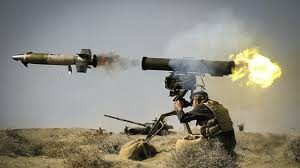The Islamic State affiliate in Egypt’s Sinai Peninsula has seized a weapons shipment that included a number of Kornet missiles, the Russian-made advanced anti-tank laser-guided weapon system. The shipment was making its way from Iran to Palestinian terror group Hamas in the Gaza Strip, according to a report in the Kuwaiti newspaper al-Jarida, like reported by toi.com.
A security source in Kuwait told the paper that the shipment is the largest seized by IS and included other GPS-guided weaponry. The source said a local IS commander was refusing to cooperate with Hamas and transfer the weapons, as cited by Hebrew-language news site Walla.
Earlier this month, as part of widening tensions that threatened to spill into another all-out war between Hamas and Israel, terrorists in Gaza fired a Kornet missile at an Israeli bus near the border, seriously injuring an IDF soldier who was on board at the time. Dozens of other soldiers had previously been on the bus and exited moments before the missile struck.
The fighting, which saw hundreds of rockets from Gaza rain down on southern Israeli cities, ended after Egypt brokered a ceasefire agreement.
Iran, an arch-foe of Israel, has supported Palestinian factions in the Gaza Strip, most notably Palestinian Islamic Jihad. Its ties with Hamas, previously close, have thawed in recent months, following years of tensions that began at the onset of the Syrian civil war in 2011 when Hamas criticized Syrian President Bashar Assad, a close ally of Iran.
Israel has over the years seized a number of weapons shipment to Hamas, sworn to Israel’s destruction, most notably in 2014 when Israeli navy commandos intercepted a ship, the “Klos-C,” in the Red Sea carrying an Iranian arms shipment headed for the Gaza Strip. The shipment included several dozen advanced Syrian M-302 missiles, with a range of up to 200 kilometers (125 miles) and a payload of up to 170 kilograms (375 pounds). The missiles were hidden in shipping containers also carrying sacks of concrete.
Israel and Egypt maintain a tight blockade of the Gaza Strip, citing security reasons and efforts to thwart weapons shipments, since Hamas seized control of the Palestinian enclave over a decade ago. Egypt controls Gaza’s southern border, which is mostly closed for the 2 million residents of the Strip as part of the blockade.
Relations between Hamas and Egypt have been hampered in recent years, particularly over Hamas’s support for Islamic militants fighting Egyptian forces in Sinai and Hamas ties to the Muslim Brotherhood. Hamas had previously refused to crack down on smuggling by IS through tunnels run by its members under the Gaza-Sinai border. Instead, the Palestinian terror group has looked to this activity as a source of income, taxing imports.
But the Palestinian group has sought to mend ties with Cairo, which has been waging a crackdown on jihadists in the restive Sinai Peninsula, home to thousands of Islamic extremists.
Hamas in recent years has arrested dozens of Islamic State members in Gaza and those affiliated with the group and other IS-inspired hardline factions, who advocate a stricter, Salafist interpretation of Islam. Some have carried out sporadic rocket attacks into Israel.
The Hamas crackdown on the Egyptian militants was a key part of restoring ties between Hamas and Cairo, which has since played a key role in ongoing Palestinian reconciliation talks.
The tensions between IS in Sinai and Hamas have often turned deadly. Last year, a suicide bomber allegedly linked to IS killed a Hamas guard in southern Gaza along the border with Egypt, in a rare attack against the Islamists. And earlier this year, IS in Sinai, also known as Sinai Province, declared “war” on Hamas and called on its members to attack the Palestinian group in a gruesome video that showed the execution of a member who allegedly smuggling weapons to Hamas.



